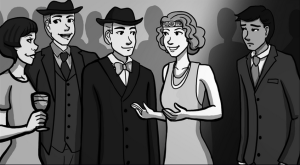The human case for raising the minimum wage is strong.
People, no matter what they do or how educated they are, deserve to be able to feed themselves, find and maintain adequate shelter, and take care of themselves with their wages.
The class divide in the United States is wider than ever – and the fact that so many people in this country work consistently, but remain in poverty is a big problem.
And that’s why campaigns to push the minimum wage up – to $10.10 an hour or even $15 an hour – are important.
Raising the minimum wage helps level the playing field in our capitalist society. It lifts up the lowest-earning among us and gives them more resources with which to build a better life.
And that’s really important! Especially in an economic system where women make up a majority of low-wage workers and more low-wage jobs are being created than any other.
But raising the minimum wage isn’t just good for the people who earn it. It’s good for the rest of us, too.
A lot of myths around the minimum wage inaccurately paint its impact as bad for workers, the economy, and the average consumer. But those myths are just that – and the real facts around the minimum wage speak much louder than they do.
Raising the minimum wage – and ensuring that all workers are paid fairly and equitable – is a key part of the economic justice we should be fighting for as feminists.
The human cause of doing so is great. Nobody should live in poverty – especially someone who works hard for their money.
As feminists, I know we all agree that empowering the poor – and supporting them, however we can, in improving their financial straits – is something we believe in. But I also know that the myths around raising the minimum wage (and what we’ve been told it will do to the rest of us) have caused some division among even those who are social justice oriented.
But the math adds up: The economic case for raising the minimum wage is solid.
The numbers prove these three myths about raising the wage wrong – and show us how raising the wage doesn’t just help low-wage earners, but also helps everyone else.
Myth #1: Raising the Minimum Wage Helps Some Workers and Hurts Others
It goes without saying that raising the minimum wage helps minimum wage workers. It empowers them to live better lives and make better financial choices, and it starts to liberate them from the vicious cycle of poverty.
But they’re not the only workers who benefit.
Raising the minimum wage isn’t just good for those earning the lowest wages. It’s good for folks at all rungs of their own organizational ladders.
“Compression” is a term that describes the pressure put on employers to raise wages for higher-paid workers when lower wages are mandated to go up. By increasing the earnings of the lowest-paid folks on staff, organizations will no doubt have to asses the earnings of those who were making close to, say, $15 an hour before the hike, and their closest peers.
A higher wage gives workers making more the right leverage to demand a raise, and some employers may even decide to raise the pay of those workers as they usher in a new mandatory raise for their lowest-earning team members.
After all, if you’re making nearly or around $35K a year, you’re making about $15 an hour. When that becomes the federal minimum wage, you’ll find yourself underpaid in comparison.
This is the ripple effect in action: Higher wages drive all wages up, just like lower wages drive all wages down.
In industries where unpaid internships have taken on a larger share of the sector, wages are falling. In industries where minimum wage workers make up a large portion of the workforce, those who supervise them will undoubtedly find their wages increasing as the wages of those they oversee increase, too.
A lot of arguments against the minimum wage, however, don’t focus on how a hike would impact workers. Instead, many people are concerned with how a federal minimum wage increase would hurt employers.
But data shows that employers would actually benefit from a minimum wage increase: They’d find a drop in expensive employee turnover costs, an increase in productivity, and more demand to fill any open positions.
It’s also important to remember that, despite our economy’s currently poor outlooks for job-seekers, a key part of how our economy works is the competition employers experience when looking for strong additions to their team.
Smart employers will want to remain competitive and snag the most talented, exceptional folks for their workforces even in the midst of a minimum wage hike – so their wages will increase across the board, even and especially for workers who don’t earn the minimum wage.
The impact of raising the minimum wage reaches far beyond the pool of minimum-wage earners. In fact, studies show that whereas 51 million workers will directly benefit from a minimum wage increase, 30 million will benefit indirectly.
That’s 64% of the workforce – and it probably includes people like you and me.
Myth #2: Raising the Minimum Wages Raises Prices, Too
It’s easy to imagine that the average consumer would pick up the price tag of raising the minimum wage.
Opponents of the push for a higher minimum wage have tried ruthlessly to convince us that the things we love or take for granted would no longer be as affordable in an economy where the lowest-earning workers are making $15 or even $10 dollars an hour in every city and state.
Over the last few years, we’ve been forced to contemplate a doomsday scenario in which a minimum wage hike makes our Big Macs, tiny city apartments, and clothing more expensive.
How dare we, after all, expect massive corporations raking in millions of dollars to absorb an increase in the minimum wage without asking us for more of our own hard-earned money to pay for it?
Of course, the companies could afford to absorb those costs.
After all, it goes without saying that multi-million dollar corporations could afford to spend some extra money on their labor force without passing it along to us. But even if the corporate chains weren’t so generous – even if the corporations and local organizations providing us with goods and services that involve low-cost labor didn’t absorb any of the cost of a minimum wage hike, prices still wouldn’t skyrocket.
Your Big Mac is not going to cost twice as much, even though the minimum wage is currently less than half of $15. You’ll still be able to afford new jeans, the modest vacations you take once a year, and even the new car you’ve been dreaming of – even if there’s a minimum wage increase as drastic as the $15 living wage those workers deserve.
And that’s because past research on minimum wage hikes proves it.
It’s been shown that for every 10% hike in the minimum wage, costs for businesses and consumers should be expected to increase by less than one-tenth of one percent of the revenue.
In other words: For every 10% spike in the minimum wage, you pay an extra .1%.
That data takes into account not only the mandated minimum wage increase, but also the ripple effect raises higher-earning workers can expect following one – and also the payroll taxes an employer adds to their expenses in the event of both.
Meanwhile, the average inflation rate in recent years has been 2.6% per year.
The impacts of a minimum wage increase on the everyday consumer are nothing compared to the impact of plain old inflation. Your cost of living will increase every year no matter how much fast-food employees and retail workers get paid.
So why not pay them more while we’re at it?
Myth #3: Raising the Minimum Wage is Bad for the Economy
The people benefitting the most from our lopsided economy – namely, massive corporations and the wealthy who run them or otherwise benefit from them – have a lot at stake when it comes to raising the minimum wage. And they’re the first to speak up and say it’s going to destroy it.
They’re wrong.
The benefits of raising the minimum wage positively impact everyone with a stake in our economy: employers, business, and taxpayers alike.
In fact, raising the minimum wage could actually help grow our economy by putting more money in a lot of pockets. It’s easy to feel like the economy is controlled and fed by corporations, but that’s not true. The average consumer keeps the US economy alive.
70% of the US economy is consumer spending. Raising the minimum wage to $15 an hour would add $450 billion a year to that economy.
It isn’t a raise for the poor that’s bad news for our economy. It’s the currently massive divide between rich and poor that exists in it right now. At the bottom of it all, money makes the world go ‘round: and when workers have no money, businesses make no money.
When consumers have more money, they buy more stuff and take business up on more offers for services. And when that happens, business profits in increase – and jobs do, too. In fact, the states that raised the minimum wage have seen more accelerated job growth than the national average.
By raising the minimum wage, we’ll actually help power the economy. We’ll increase demand for products, which increases profit. And we’ll create more jobs in the process.
It’s not just business owners and middle-class consumers who will reap the benefits from a minimum wage hike alongside low-wage workers, though.
All taxpayers stand to gain from it, too.
Right now, a lot of workers earning the minimum wage (or close to it) are living in poverty. Because that’s true, regular taxpayers are subsidizing the survival of the employees of behemoth companies like Wal-Mart.
The federal government gives an average of $8,800 to low-earning households every year in the form of social assistance programs like welfare and food stamps.
But the federal government pays only $4,000 on average to support households earning $35,500 a year – which is about the wage of a full-time, $15 an hour minimum wage worker.
With more money comes more capability for self-sufficiency for the working poor, as well as liberation from government systems that help them scrape by.
That’s why a minimum wage hike pays off for taxpayers, who stand to save about $153 billion a year once it goes into effect.
If this is all too abstract, though, perhaps some history will make it clear that when it comes to raising the minimum wage, we don’t stand to lose anything.
Since 1938, the federal minimum wage has gone up 22 times. (In fact, if it went up to account for cost of living and inflation, it’d be over $20 today.) And since 1938, the GDP per capita in this country has steadily increased – even in the years those hikes took place.
It’s not clear, looking at this data, exactly how the economy stands to suffer because of a higher minimum wage.
Certainly the workers stand to benefit – both those directly impacted and those indirectly impacted, too. And employers and business owners can expect to bring in more profits, too. Plus, we’ll all save a little bit on our taxes. And in the process, we’ll help lift some folks out of living poverty.
***
Raising the minimum wage makes sense – for businesses, for low-wage earners, and for all taxpayers. And we can all play a part in making it happen.
We can join in the Fight for 15 and demand a better future for one of the country’s largest labor forces. We can support political initiatives at the city, state, and federal level to give low-wage workers a wage. We can support businesses that pay a living wage, unions that help workers fight for them, and politicians who demand them.
We can all help ensure that all workers in the US – not just the elite among them – can get by. And we’ve got nothing to lose by doing so.
[do_widget id=’text-101′]
Carmen Rios is a Contributing Writer for Everyday Feminism. She splits her time disparately between feminist rabble-rousing, writing, public speaking, and flower-picking. A professional feminist by day and overemotional writer by night, Carmen is currently Communications Coordinator at the Feminist Majority Foundation and the Feminism and Community Editor at Autostraddle. You can follow her on Twitter @carmenriosss and Tumblr to learn more about her feelings.
Search our 3000+ articles!
Read our articles about:
Our online racial justice training
Used by hundreds of universities, non-profits, and businesses.
Click to learn more
Most Read Articles
- « Previous
- 1
- …
- 30
- 31
- 32




















